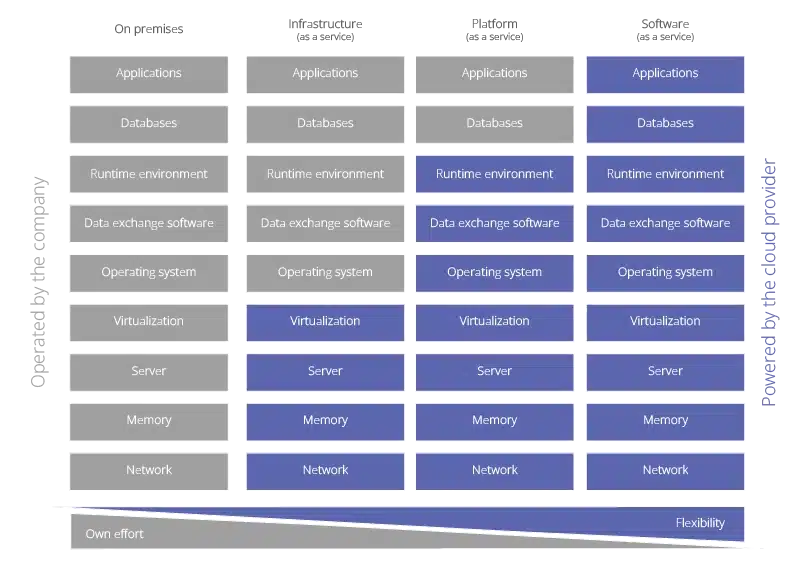Choosing the right cloud provider is an important decision for a company. But which provider is right for my company?
Definition: What is a cloud?
The term cloud refers to a technology that provides computing power, storage space, databases and applications via the Internet. Instead of working locally (“on premise”) on a computer or server, the data and applications are stored in a remote data center and made accessible from there. In the case of cloud solutions for companies, a software provider offers its product or services under monthly payment for use via a cloud data center. This means that the program does not first have to be downloaded to the user’s own end device, but can be accessed via Internet use. Although the program then appears to run on the user’s own computer, the processes and calculations are handled in a remote data center.
Data is transferred between the end device – or client – and the cloud via end-to-end encryption. This ensures basic protection of company data against unauthorized access.
However, as soon as the data is stored in a cloud and no longer on an on-site server, other data protection requirements also arise because the data is managed by third-party providers.
Private Cloud vs. Public Cloud – What’s the difference?
Private and public clouds are two types of cloud computing models, each with their own advantages and disadvantages. A private cloud is a cloud infrastructure that is used exclusively by a single organization or company, while a public cloud is shared by a broader group of users, often many companies.
A major advantage of a private cloud is that the organization has complete control over the infrastructure, and therefore control over security and privacy. A public cloud, on the other hand, offers the advantage that the scaling and management of the infrastructure is handled by an experienced cloud provider, resulting in greater flexibility and lower capital investment.
To this end, a private cloud can be significantly more expensive, as the organization must bear the entire cost of the infrastructure. In contrast, a public cloud can be more cost-effective because the costs can be shared among multiple users.
Need help migrating to the cloud?
jemix is at your side for all questions regarding cloud solutions, migration and storage. Get in touch with us.
Hybrid cloud – The advantages of both models combined
A hybrid cloud is a cloud environment that consists of a combination of public and private clouds. Here, the different clouds are connected via a common platform. Thus, in a hybrid cloud, companies can divide their data and applications and switch between public and private clouds as needed.
This not only enables a high degree of flexibility and scalability, but also better control over data and resources. By using a hybrid cloud, companies can also reduce costs by not having to host all their data and applications in a single cloud infrastructure.
Hybrid cloud solutions for companies are mainly used when there are special requirements for data protection. Thanks to a hybrid cloud, company data that requires a particularly high level of protection, such as customer data, can be stored and secured separately from the rest of the company data.
The most common service models
1. Infrastructure as a service (IaaS).
IaaS provides basic IT infrastructure components such as virtual machines, networks and storage as a service. It allows companies to deploy and manage their own applications and operating systems on this infrastructure.
2. Platform as a service (PaaS).
PaaS is a cloud service model in which a complete development and deployment platform is provided as a service. It provides developers and enterprises with a cloud-based platform on which they can develop, test, deploy, and manage applications without having to worry about the underlying infrastructure.
3. Software as a service (SaaS).
SaaS refers to a model in which software applications are delivered over the Internet. Instead of installing the software on local computers or servers, users can access and use the application over the Internet.

What cloud solutions are available for enterprises?
The cloud platform market is divided among the major well-known tech platforms. Almost the entire cloud market consists of services offered by these well-known US companies. Amazon, Microsoft, Google, IBM. All these companies are competing for the favor of enterprises with their cloud offerings.
Amazon clearly sets the tone with its cloud platform “Amazon Web Services” and currently holds about a third of the market (34%). Microsoft Azure comes in behind and accounts for 21% of the market revenue. The Google Cloud Platform comes in at 10% and IBM Cloud at 4%.
Here, the various cloud providers differ in their support for specific technologies. Each cloud provider offers a variety of functions and services that differ in terms of their availability and functionality.
Accordingly, the question is not which provider is the best, but which is the right fit for the requirements of the company in question.
To find out which cloud provider is a good fit for your company, we will introduce you to the ones already mentioned in a little more detail.
Are you looking for a cloud solution partner?
Do you have questions about the topic of cloud? Our cloud experts will be happy to answer any questions you may have!
Amazon Web Services (AWS)
Amazon Web Services is the largest and best-known cloud platform on the market, offering a wide range of services and solutions – including Infrastructure-as-a-Service (IaaS), Platform-as-a-Service (PaaS),Software-as-a-Service (SaaS), and several variants of online storage.
AWS operates data centers in various countries and regions around the world and has built a global presence. This means that with AWS, enterprises can guarantee fast and reliable performance and availability of their applications and data in almost any part of the world.
AWS’s different solutions can be selected by industry, technology, or by a specific scenario. The selection ranges from the use of data lakes & analytics and cloud storage to machine learning and serverless data processing.
AWS Microservices
One of the most important and widely used services on AWS is the AWS Lambda microservice. This serverless service allows developers to run code as individual functions. Lambda makes it quick and easy to build scalable, low-maintenance applications.
AWS API Gateway provides developers with the ability to create, deploy, and manage REST APIs. With API Gateway, developers can easily scale, maintain, and monitor their APIs.
The main advantages at a glance:
- Scalability and flexibility of cloud storage through pay-per-use model.
- A wide range of services and products, from infrastructure to platforms to applications
- Comprehensive security and compliance options
- Extensive integration options with other products and services

Google Cloud Platform (GCP)
The Google Cloud Platform (GCP) is – as the name suggests – a cloud storage platform provided by Google. A strong focus is also placed here on the development and deployment of applications. Developers can use the Google Cloud Platform to create, test and deploy applications.
One of the benefits of GCP is its tight integration with other Google products such as Gmail, Google Drive and Google Maps.
The platform also has a strong presence in artificial intelligence (AI) and machine learning (ML), with a range of tools and services that make it easier for companies to integrate AI and ML into their business processes.
The main advantages at a glance:
- Innovative technologies such as AI and machine learning
- Extensive integration capabilities with other Google products and services
- Stringent security and compliance standards
- Reliable and scalable infrastructure, both for corporations and small and medium-sized businesses
Microsoft Azure
Microsoft Azure is another major cloud provider that offers a wide range of online storage services and solutions, including IaaS, PaaS and SaaS. One of the advantages of Microsoft Azure is its tight integration with other Microsoft products such as Office 365 and Dynamics 365.
In addition, the Azure platform allows companies to leverage the capabilities of “Open AI” language models for a variety of applications. For example, Azure provides managed SQL Cloud databases for migration and modernization.
In addition, Microsoft Azure is one of the leading providers in the area of hybrid cloud solutions, which can be particularly attractive for companies that work with confidential customer data.
The main advantages at a glance:
- Integration with other Microsoft products and services, including Office 365 and Power Platform.
- Support for a wide range of operating systems, databases, tools and programming languages
- Robust security and compliance options
- Ability to create hybrid solutions with on-premises resources and cloud resources

IBM Cloud
The technology giant IBM also operates its own data centers and a cloud platform to provide its customers with a wide variety of online services as part of cloud solutions.
One of the advantages of IBM Cloud here is also logically the close integration with other IBM products such as Watson and Blockchain, which enables companies to integrate AI and Blockchain solutions into their business processes.
IBM Cloud especially touts excellence in cloud security, which means that companies can use a highly secure and regulated environment to protect their data and applications.
The main advantages at a glance:
- Tight integration with IBM products such as Watson and Blockchain.
- Wide range of services and solutions, including IaaS, PaaS and SaaS
- Market leader in secure cloud solutions
- Wide range of data centers and regions for better global presence.
Data security: How secure is my data in the cloud?
The security of data in the cloud is an essential factor for cloud solutions for companies and private individuals using cloud services. Especially since the number of cyber attacks has increased significantly in recent years. Most cloud providers have implemented extensive security measures and safeguards to protect their customers’ data. These include firewalls, encryption, access controls, data redundancy and regular security audits.
Nevertheless, there is always some risk of loss or compromise of data in the cloud, especially due to human error, cyberattacks, or vulnerabilities in the cloud infrastructure.
It is therefore important that users carefully manage their data in the cloud, use strong passwords, implement security measures, and clarify data protection responsibilities and liability with their cloud providers.
Similar topics
Network Security
In an increasingly interconnected world, network security has become an indispensable part of businesses, organizations and governments. The impact of cyberattacks and data loss can be devastating
IT-Outsourcing
A recognizable trend in the course of digitalization is the outsourcing of IT services and expertise to external IT companies. Due to the leap and unprecedented campaign of cloud technology
The need for an IT security concept
An IT security concept is a comprehensive strategic document that describes the measures and policies a company or organization takes to ensure the security of its IT systems.




